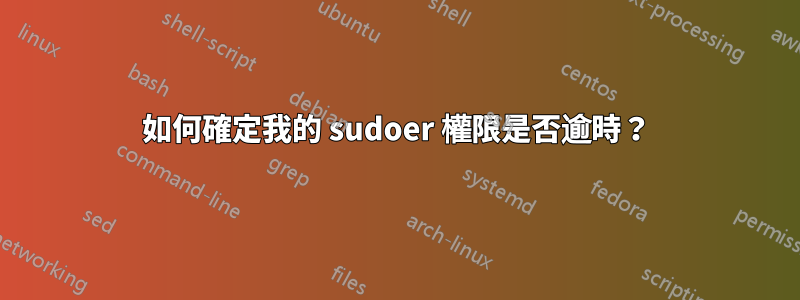
我正在編寫一個腳本,該腳本以sudo 身份運行命令,並且僅當我的sudo 權限超時才時才回顯一行文本,因此僅當使用sudo 運行命令需要我的用戶(而不是root)再次輸入其密碼時。
我如何驗證這一點?請注意,$(id -u)即使以 sudo 身份運行也會返回我當前的用戶 ID,因此無法檢查它是否與 0 匹配...
我需要一種可以安靜地檢查這一點的方法。
答案1
使用該選項-n檢查您是否仍擁有權限;從man sudo:
-n,--非互動式
避免提示使用者進行任何類型的輸入。如果命令運行需要密碼,sudo 將顯示錯誤訊息並退出。
例如,
sudo -n true 2>/dev/null && echo Privileges active || echo Privileges inactive
sudo -n true請注意,在檢查和實際使用權限之間,權限可能會過期。您可能想直接嘗試,sudo -n command...並在失敗的情況下顯示一條訊息,並可能重試sudo互動運行。
編輯:另請參閱下面 ruakh 的評論。
答案2
跑步:
sudo -nv
如果您的 sudo 權限已逾時,則會以退出代碼 1 退出並輸出:
sudo: a password is required
如果您具有有效的快取憑證,則此命令將成功並且不輸出任何內容。
因此,將所有內容放在一起,這是一個腳本默默檢查您是否有有效的快取憑證:
if sudo -nv 2>/dev/null; then
echo "no sudo password required"
else
echo "sudo password expired"
fi
如同提到的其他答案/評論,-v如果有任何提示,則 sudo 的選項(「驗證」)會默默地更新快取的憑證,否則會提示進行驗證以產生快取的憑證,並且選項-n(「非互動式”)會阻止sudo 產生任何互動式提示,例如身份驗證提示。
答案3
sudo -nv工作正常,但會因 sudo 錯誤和 pam 身份驗證資訊污染系統日誌。我需要檢查 bash 提示字元的 sudo 權限,因此它經常被執行,而我的日誌幾乎只包含這些雜訊。
可以直接解析 sudo 時間戳檔案 - 我為它寫了一個小的 C util:
/* compile and set permissions: */
/* $ gcc checksudo.c -o checksudo -std=gnu99 -O2 */
/* $ chown root:root checksudo */
/* $ chmod +s checksudo */
#define USERNAME "replace-with-your-username"
#define TIMEOUT 5
#include <sys/types.h>
#include <sys/stat.h>
#include <unistd.h>
#include <stdio.h>
#include <errno.h>
#include <string.h>
#include <time.h>
void timespec_diff(struct timespec *start, struct timespec *stop, struct timespec *result) {
if ((stop->tv_nsec - start->tv_nsec) < 0) {
result->tv_sec = stop->tv_sec - start->tv_sec - 1;
result->tv_nsec = stop->tv_nsec - start->tv_nsec + 1000000000;
} else {
result->tv_sec = stop->tv_sec - start->tv_sec;
result->tv_nsec = stop->tv_nsec - start->tv_nsec;
}
return;
}
int main(int argc, char** argv) {
if (geteuid() != 0) {
printf("uid is not 0 - checksudo must be owned by uid 0 and have the setuid bit set\n");
return 2;
}
struct timespec current_time;
if (clock_gettime(CLOCK_BOOTTIME, ¤t_time) != 0) {
printf("Unable to get current time: %s\n", strerror(errno));
return 2;
}
struct stat ttypath_stat;
if (stat(ttyname(0), &ttypath_stat) != 0) {
printf("Unable to stat current tty: %s\n", strerror(errno));
return 2;
}
FILE* timestamp_fd = fopen("/var/run/sudo/ts/" USERNAME, "rb");
if (timestamp_fd == NULL) {
printf("Unable to open sudo timestamp file: %s\n", strerror(errno));
return 2;
}
long offset = 0;
int found = 0;
while (1) {
if (fseek(timestamp_fd, offset, SEEK_SET) != 0) {
printf("Failed to seek timestamp file: %s\n", strerror(errno));
return 2;
}
unsigned short timestamp_entry_header[4];
if (feof(timestamp_fd)) {
printf("matching timestamp not found\n");
return 2;
}
if (fread(×tamp_entry_header, sizeof(unsigned short), 4, timestamp_fd) < 4) {
break;
}
if (ferror(timestamp_fd)) {
printf("IO error when reading timestamp file\n");
return 2;
}
// read tty device id
if (timestamp_entry_header[2] == 2 && timestamp_entry_header[3] == 0) {
if (fseek(timestamp_fd, offset + 32, SEEK_SET) != 0) {
printf("Failed to seek timestamp file: %s\n", strerror(errno));
return 2;
}
dev_t tty_dev_id;
if (fread(&tty_dev_id, sizeof(dev_t), 1, timestamp_fd) < 1) {
printf("EOF when reading tty device id\n");
return 2;
}
if (tty_dev_id == ttypath_stat.st_rdev) {
// read timestamp
if (fseek(timestamp_fd, offset + 16, SEEK_SET) != 0) {
printf("Failed to seek timestamp file: %s\n", strerror(errno));
return 2;
}
struct timespec sudo_time;
if (fread(&sudo_time, sizeof(struct timespec), 1, timestamp_fd) < 1) {
printf("EOF when reading timestamp\n");
return 2;
}
struct timespec time_since_sudo;
timespec_diff(&sudo_time, ¤t_time, &time_since_sudo);
found = time_since_sudo.tv_sec < TIMEOUT * 60;
break;
}
}
offset += timestamp_entry_header[1];
}
fclose(timestamp_fd);
return !found;
}


